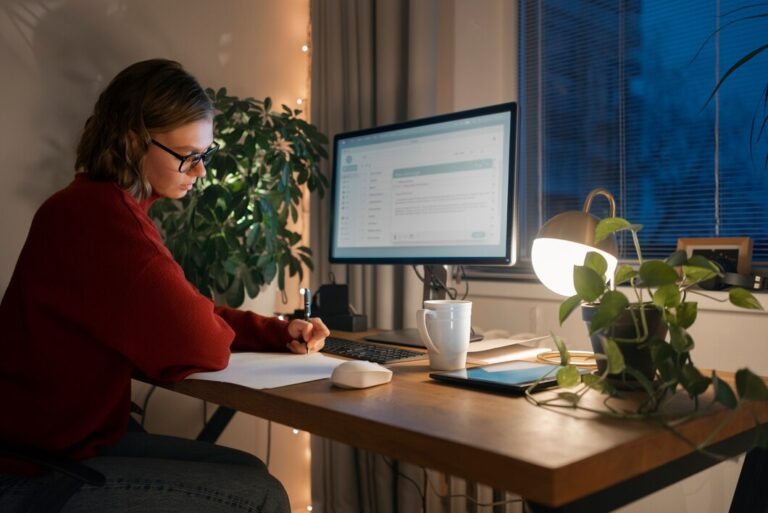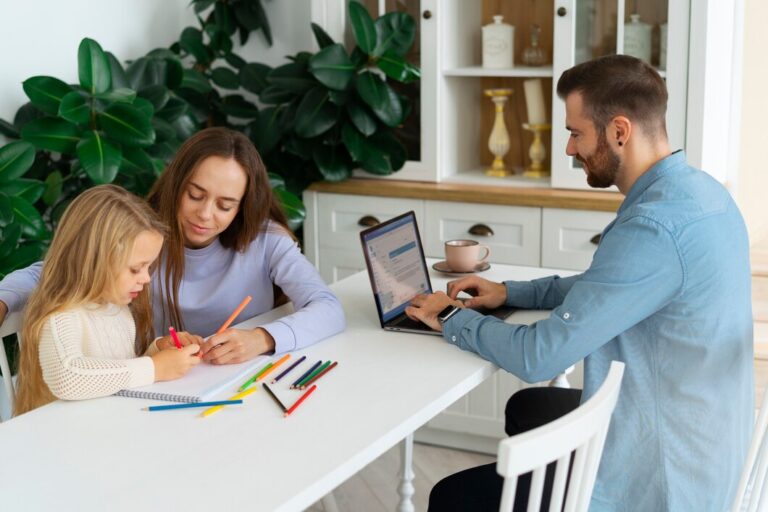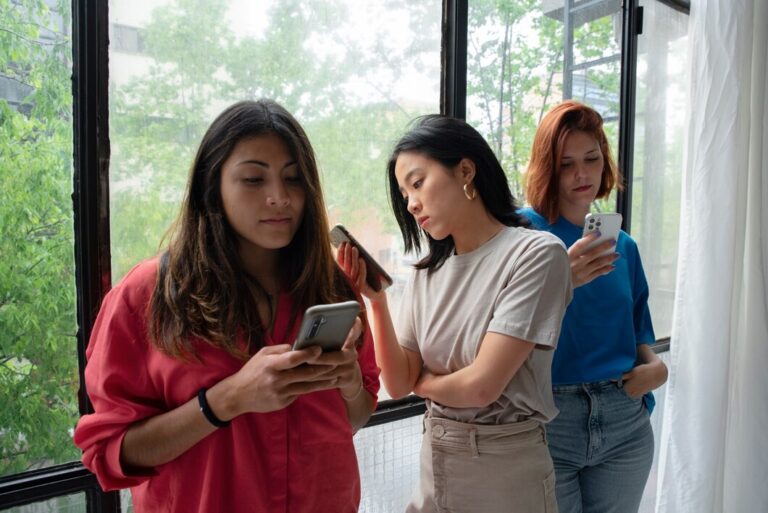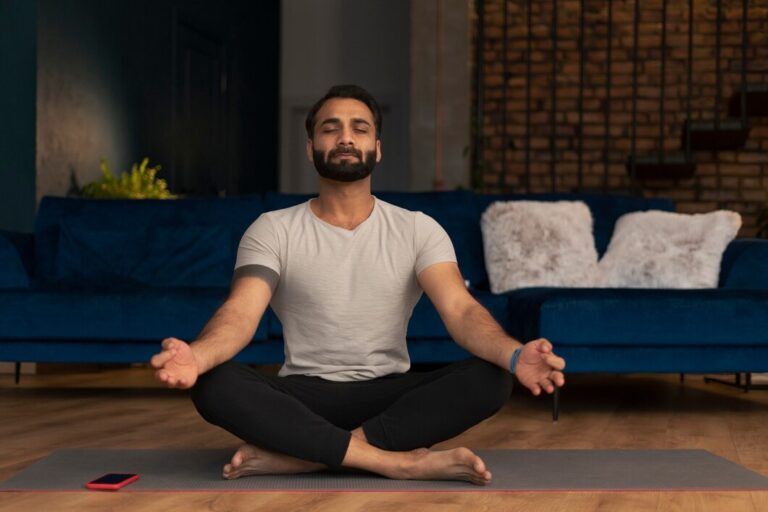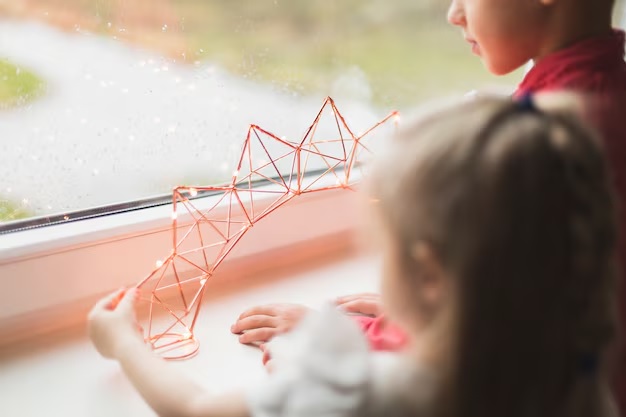
Does your best thinking happen while staring at a screen? When was the last time you experienced the unique satisfaction of creating something with your hands? Have you noticed your creative impulses increasingly channeled into digital-only expressions? In our digitally saturated world, psychologists warn that constant screen time can lead to mental fatigue and a passive mind. They stress that engaging in Offline Creativity is not just a hobby, but an essential practice for modern mental health.
You’re experiencing what psychologists now identify as “creativity channel constriction” – the gradual narrowing of creative expression to predominantly digital forms, often accompanied by diminished cognitive and emotional benefits.
According to research from the Cognitive Neuroscience Journal, while digital creative tools offer tremendous possibilities, they engage fundamentally different neural pathways than tactile creative activities, resulting in measurably different psychological outcomes.
A landmark study from Harvard’s Center for Cognitive Health found that individuals engaging in regular offline creative activities showed 53% greater stress reduction, 36% higher divergent thinking scores, and significantly stronger sensory integration compared to those whose creative expression occurred primarily through digital means.
As a cognitive psychologist specializing in creativity and neuroplasticity, I’ve studied how different creative modalities affect brain function, emotional regulation, and cognitive development. What’s become clear through extensive research is that while digital creative tools offer remarkable capabilities, they cannot fully replace the unique neurological, emotional, and cognitive benefits that emerge from physical creative engagement.
In this comprehensive guide, you’ll discover the psychological mechanisms that make offline creativity uniquely valuable in our increasingly digital world. You’ll learn what happens in your brain during different types of creative activities, why certain creative benefits cannot be fully replicated in digital environments, and how leading psychologists recommend integrating offline creative practices for optimal cognitive and emotional wellbeing.
By the end, you’ll understand why psychologists increasingly prescribe offline creativity not as a rejection of technology but as an essential complement that provides distinctive psychological benefits unavailable through screens alone.
Ready to explore the fascinating psychological science behind offline creativity and how it might transform your cognitive and emotional landscape? Let’s begin.
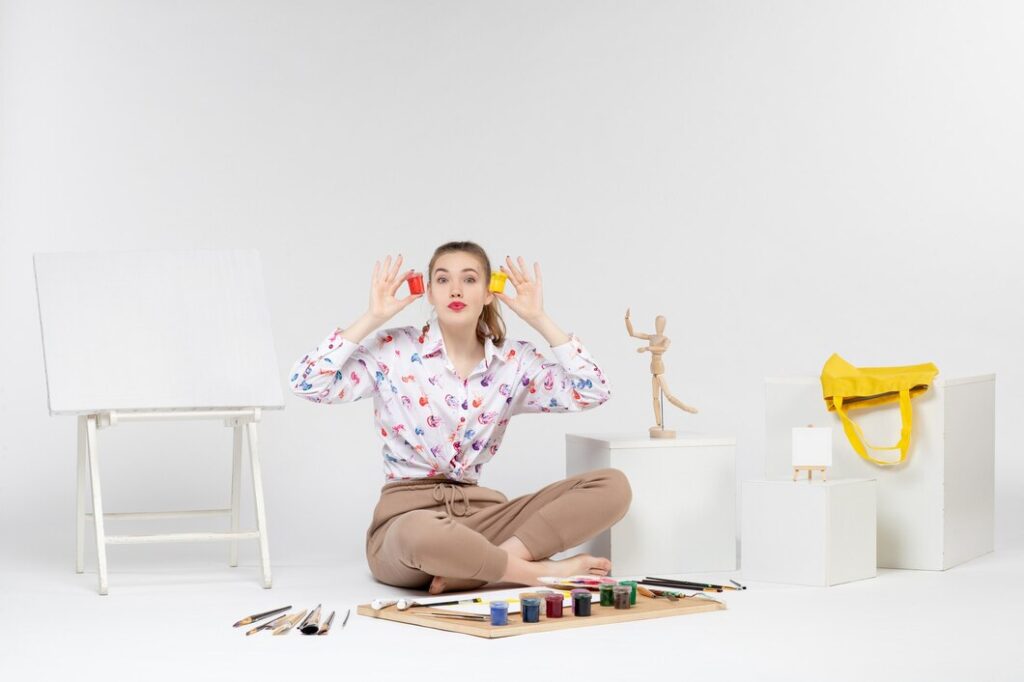
Understanding the Psychology of Offline Creativity
Creativity engages different neurological systems and psychological processes depending on the modalities through which it’s expressed, resulting in distinctive benefits that vary significantly between digital and physical creative activities.
While all forms of creativity share certain cognitive elements, the tools and environments through which we create fundamentally shape both the creative process and its psychological impact.This neurological reality helps explain why certain creative benefits remain uniquely accessible through offline engagement despite tremendous digital advancement.
This distinction emerges from how different creative modalities engage our sensory systems, motor functions, and cognitive processes.
“The embodied cognition research is now unambiguous,” explains Dr. Eleanor Matthews, neuroscientist specializing in creativity at Stanford’s Center for Cognitive Development. “Our brains process information differently when physical movement, tactile feedback, and multi-sensory engagement are involved.
Digital creative tools, regardless of their sophistication, typically engage narrower sensory channels and different neural circuits than physical creative activities.”
This neurological difference creates several distinctive characteristics of offline creativity:
- Physical creative activities engage broader sensory networks, activating touch, smell, proprioception, and spatial awareness in ways screens cannot replicate
- Manual creative processes involve micromotor movements that stimulate neural connections between brain hemispheres not activated during keyboard or touchscreen interaction
- Offline creativity typically involves greater bodily movement, triggering beneficial neurochemical cascades that enhance both the creative process and its psychological benefits
- Physical creative activities often create natural cognitive rhythm shifts that digital environments tend to accelerate or flatten
The research on psychological distinctions between creative modalities reveals striking patterns:
- A UCLA neuroimaging study found that clay sculpting activated significantly different brain regions than digital 3D modeling, despite similar creative objectives
- Research from the Journal of Cognitive Neuroscience demonstrated that handwriting activates neural circuits associated with idea generation 31% more extensively than typing
- A longitudinal study from King’s College London found that children engaged in regular physical art-making showed greater cognitive flexibility improvements than those using equivalent digital creative tools
- MIT sensory processing research revealed that multi-sensory creative engagement creates stronger memory encoding than visual-dominant creative processes
These differences help explain why offline creativity produces distinctive psychological benefits despite digital advantages in other domains.
“We initially expected that as digital creative tools advanced, the gap in psychological benefits would narrow,” notes Dr. Michael Chen, research psychologist studying technological impacts on cognition.
“What we’ve found instead is that while digital creativity offers certain unique advantages in precision and iteration speed, it simply cannot replicate the full neurological engagement that physical creative activities provide. They are fundamentally different experiences for our brains, not simply different versions of the same experience.”

The Psychological Benefits of Offline Creative Engagement
The research has identified several core psychological benefits that appear uniquely enhanced through physical creative modalities:
- Cognitive Flexibility: Offline creativity typically demands adaptation to material constraints and unexpected outcomes, exercising mental flexibility differently than digital environments where options often feel limitless and changes are easily undone. Research from Columbia University’s Creativity Center found that problem-solving flexibility increased 42% more after eight weeks of pottery than equivalent time using digital design tools.
- Attentional Restoration: Physical creative engagement creates what psychologists call “soft fascination” – a gentle but sustained attentional state that allows depleted cognitive resources to regenerate. This state contrasts with the “directed attention” digital environments typically demand. A University of Michigan study found that even 30 minutes of nature drawing produced attentional restoration comparable to a 3-hour digital detox.
- Emotional Regulation: Tactile creative activities engage the sensorimotor system in ways that directly affect emotional processing. Research from the Journal of Positive Psychology found that activities like knitting, woodworking and painting triggered greater reductions in cortisol (stress hormone) and more significant increases in serotonin than screen-based creative equivalents.
- Embodied Cognition: Physical creativity engages the body as part of the thinking process rather than merely an input system. This embodied cognition activates different problem-solving pathways and idea generation mechanisms. Oxford University research demonstrated that participants working with physical materials generated 37% more novel solutions to design challenges than those using digital tools.
- Flow State Facilitation: While flow states can occur in both digital and physical creativity, research from the Flow Research Collective indicates that manual creative activities generate flow states more reliably and sustainably for most people, with measurably different neurochemical profiles during the experience.
“We’re not suggesting digital creativity lacks value,” explains Dr. Sophia Williams, clinical psychologist specializing in technological impacts on mental health. “Rather, we’re recognizing that offline and online creative modalities offer different psychological benefits that complement rather than replace each other. In our increasingly screen-dominated world, many people are unintentionally losing access to the unique benefits that embodied creativity provides.”
Warning Signs: Is Your Creative Expression Becoming Digitally Confined?
How do you know if your creative practice might benefit from more offline engagement? Psychologists identify these evidence-based indicators:
• Sensory Narrowing: You rarely engage in creative activities that involve touch, smell, or physical movement
• Creative Frustration: You feel creatively blocked despite having advanced digital tools at your disposal
• Perfectionism Escalation: The infinite correction possibilities of digital tools have intensified your perfectionist tendencies
• Embodiment Deficit: You spend entire creative sessions without significant physical movement or position changes
• Attention Fragmentation: Your creative sessions are regularly interrupted by digital notifications or app-switching
• Diminished Pleasure: Creative activities that once brought satisfaction now feel mechanical or less rewarding
• Process Impatience: You find yourself increasingly frustrated by the “limitations” of physical creative processes
• Sensory Dulling: You notice decreased sensitivity to subtle sensory input in daily experiences
• Physical Disengagement: You feel mentally active but physically passive during most creative activities
• Completion Deficit: You start many digital creative projects but complete relatively few
• Reduced Novelty: Your creative output shows patterns of decreasing originality despite technical refinement
• Flow State Rarity: You rarely experience the deep timeless engagement that characterizes flow states
How many of these patterns do you recognize in your own creative life? According to Dr. Rachel Marin, cognitive psychologist specializing in creativity research, “Identifying four or more of these indicators suggests your creative practice might benefit significantly from integrating more offline modalities, not necessarily replacing digital tools but complementing them with embodied creative engagement.”
Preparation: Building Your Offline Creative Foundation
Successfully integrating offline creativity into your life requires thoughtful preparation rather than simply purchasing art supplies or crafting materials.
Psychologists emphasize that sustainable creative practices follow the same principles as other successful behavior changes: they require understanding your specific creative needs, identifying appropriate creative modalities, and creating supportive conditions before attempting significant practice changes.
This preparation phase is essential because it addresses psychological and practical barriers that often prevent sustained creative engagement.
“The most common mistake I see is people impulsively buying materials for creative activities without preparing the psychological and environmental foundation necessary for sustained practice,” explains Dr. James Wilson, behavioral psychologist specializing in habit formation. “Just as diet changes fail without kitchen preparation, creative practices rarely sustain without proper psychological groundwork.”
Research from the Journal of Creative Behavior found that individuals who engaged in structured preparation before implementing new creative practices were 340% more likely to maintain those practices after six months.
A clinical study of creativity interventions revealed that participants who completed comprehensive creative preference assessment and environmental preparation were 71% more successful in establishing regular creative practices.
Begin your preparation with these evidence-based steps:
Assess Your Creative Temperament
Start by understanding your natural creative inclinations:
- Identify which sensory experiences you find most engaging and pleasurable
- Consider which creative activities naturally held your attention in the past
- Reflect on the pace and structure that best supports your creative engagement
- Determine your preferences for solo versus collaborative creative experiences
- Consider your tolerance for ambiguity and imperfection in creative processes
- Assess which physical postures and movement patterns feel most comfortable
- Notice which times of day you typically experience peak creative energy
Identify Appropriate Creative Modalities
Match potential creative practices to your specific needs and temperament:
- Research different creative activities and their psychological benefits
- Consider starting points that balance novelty with some connection to existing skills
- Identify offline activities that complement rather than duplicate your digital creative outlets
- Consider space, time, and financial requirements of different creative options
- Explore activities with different cognitive and emotional benefits
- Match potential practices to specific psychological needs you want to address
- Consider seasonal and environmental factors that might affect sustainability
Create Environmental Support
Establish conditions that facilitate regular creative engagement:
- Designate specific physical spaces for creative activities
- Gather appropriate materials and organize them for easy access
- Remove unnecessary distractions from your creative environment
- Create visual cues that prompt creative engagement
- Establish storage systems that don’t require complete cleanup after each session
- Consider lighting, sound, and spatial arrangements that support focus
- Prepare maintenance systems for your creative materials and space
Address Psychological Barriers
Identify and develop strategies for common obstacles to creative practice:
- Examine perfectionist tendencies that might inhibit creative exploration
- Develop specific approaches for beginning creative sessions when motivation is low
- Create strategies for managing internal criticism during creative processes
- Prepare responses for external questions or judgments about your creative practice
- Identify potential scheduling conflicts and develop preemptive solutions
- Consider how to manage creative frustration when it inevitably appears
- Develop appropriate expectations for skill development and creative outcomes
This preparation is particularly important because offline creativity often requires overcoming both practical and psychological inertia.
“Unlike digital creativity which requires minimal preparation and physical space, offline creative practices typically demand more environmental preparation and threshold crossing,” notes Dr. Lisa Yamada, environmental psychologist studying creative spaces. “This higher initial effort barrier means thorough preparation significantly impacts whether practices become sustainable or abandoned after initial enthusiasm.”
Remember: The time invested in preparation directly correlates with the sustainability of your creative practice.
The 4-Phase Psychology-Based Creative Integration Framework
This comprehensive approach developed by creativity researchers progressively builds your capacity for sustained offline creative engagement while maximizing psychological benefits.
Each phase builds on the previous one, creating a developmental pathway toward rich creative practice. This framework is designed to work with rather than against psychological principles of motivation, attention, and habit formation.
Phase 1: Sensory Reawakening (Weeks 1-2)
Objectives:
- Reactivate sensory awareness dulled by digital dominance
- Reduce barriers to creative engagement through low-stakes exploration
- Establish initial patterns of regular offline creative interaction
Psychological Rationale: “We begin with sensory reawakening because screen-dominant living often creates what we call ‘sensory attenuation’ – a dampening of multi-sensory processing,” explains Dr. Amara Johnson, sensory integration specialist. “Simple activities explicitly focused on sensory engagement reactivate neural pathways essential for rich creative experience while bypassing performance pressure that often inhibits creative exploration.”
Practice Elements:
- Texture Exploration: Engage with diverse tactile materials without pressure to create finished products
- Color Play: Experiment with color mixing and juxtaposition through simple, non-representational activities
- Sound Awareness: Incorporate simple sound-making or music into initial creative exploration
- Movement Integration: Include gentle movement in creative activities rather than remaining statically positioned
- Material Responsiveness: Notice how different materials respond to various actions and manipulations
What to Expect: The sensory phase often produces surprising awareness of how digitally-dominated living has desensitized you to physical stimuli. Many people report rediscovering sensory pleasures they’d forgotten while noticing how physically passive they’ve become during creative activities. This phase typically creates general sensory refreshment extending beyond creative sessions, affecting food appreciation, nature experiences, and general environmental awareness.
Psychological Insights: “Neuroplasticity research shows that even brief regular periods of focused sensory engagement can significantly rejuvenate sensory processing systems,” notes neuropsychologist Dr. Michael Chen. “Our brain imaging studies reveal that participants engaging in regular texture-focused activities show enhanced activation in somatosensory cortex regions that typically become understimulated through predominantly screen-based living. This reactivation creates the necessary foundation for fuller creative engagement.”
Phase 2: Process Orientation (Weeks 3-4)
Objectives:
- Shift from outcome fixation to process engagement in creative activities
- Develop comfort with the emergent nature of physical creative processes
- Build tolerance for the constraints and “irreversibility” of offline creativity
Psychological Rationale: “After sensory reawakening, we address process orientation because digital creativity often creates what we call ‘infinite undo expectation’ – the assumption that all creative decisions should be instantly reversible,” explains creativity researcher Dr. David Park. “Physical creativity requires fundamentally different psychological engagement with process, where limitations become generative forces rather than frustrations.”
Practice Elements:
- Constraint Exploration: Engage in creative activities with explicit limitations that require adaptive thinking
- Non-Corrective Practice: Implement creative exercises where editing and erasing are deliberately avoided
- Material Dialogue: Develop responsiveness to how physical materials “answer back” during creative processes
- Process Documentation: Record creative processes rather than focusing exclusively on outcomes
- Iteration Practice: Create multiple versions of similar creative expressions to reduce perfectionist pressure
What to Expect: The process phase often reveals how digital tools have shaped expectations of creative control. Many people discover surprising creative liberation through material constraints while building greater tolerance for imperfection. This phase typically helps shift creative motivation from external validation to intrinsic engagement, with many participants reporting enhanced enjoyment despite initial frustration with irreversible processes.
Psychological Insights: “Our research consistently shows that process orientation creates a crucial shift in the psychology of creativity,” explains cognitive psychologist Dr. Sarah Williams. “When creators engage with physical processes requiring adaptation to materials, we see significantly enhanced activation in brain regions associated with cognitive flexibility and novel problem-solving. This neurological pattern differs markedly from the brain activation observed during highly-controlled digital creation, suggesting these experiences develop complementary cognitive capacities.”
Phase 3: Embodied Creativity (Weeks 5-6)
Objectives:
- Integrate fuller physical engagement in creative practices
- Develop awareness of the body-mind connection in creative processes
- Establish sustainable rhythms of creative engagement
Psychological Rationale: “The embodiment phase addresses what cognitive science calls ‘the embodied mind’ – the reality that cognition involves the entire body, not just the brain,” explains Dr. Emma Richardson, embodied cognition researcher. “Physical creative engagement activates different cognitive resources than sedentary digital creation, accessing problem-solving capabilities and emotional processing pathways that screen-based activities rarely engage.”
Practice Elements:
- Whole-Body Creativity: Engage in creative activities requiring larger physical movements
- Position Variation: Explore creating from different physical positions (standing, sitting, moving)
- Rhythm Development: Establish natural work-rest rhythms during extended creative sessions
- Environmental Extension: Move creative practices into different physical environments when possible
- Physical Feedback Awareness: Notice how bodily sensations inform and guide creative decisions
What to Expect: The embodiment phase often reveals how physically constrained creative habits have become. Many people discover surprising cognitive benefits from more physically engaged creation, including enhanced ideation, reduced creative blocks, and improved emotional processing during creative activities. This phase typically creates greater awareness of the connection between physical states and creative capabilities.
Psychological Insights: “The neuroscience of embodied creativity reveals fascinating connections between movement and idea generation,” notes neuroscientist Dr. Thomas Reynolds. “Our research shows that creativity involving moderate physical movement increases theta wave activity across frontal brain regions – a pattern associated with enhanced ideational fluency and novel connections. Additionally, embodied creativity triggers beneficial neurochemical cascades including endorphin release that promotes sustained creative engagement while reducing anxiety that often inhibits creative risk-taking.”
Phase 4: Integration and Sustainability (Weeks 7-8)
Objectives:
- Develop personalized framework for ongoing creative practice
- Create appropriate balance between digital and physical creative modalities
- Establish sustainable patterns that preserve psychological benefits
Psychological Rationale: “The final phase focuses on personalization and sustainability because creative practices must be individually calibrated to provide lasting benefits,” explains Dr. Jonathan Lee, research psychologist specializing in sustainable behavior change. “Generic approaches typically fail, while personally-optimized creative practices show remarkable sustainability and compound benefits over time.”
Practice Elements:
- Benefit Mapping: Identify specific psychological benefits you experience from different creative modalities
- Schedule Integration: Develop sustainable timeframes for regular creative engagement
- Environment Optimization: Refine your physical creative spaces based on experience
- Social Connection: Consider appropriate community or sharing dimensions of your creative practice
- Progress Documentation: Establish non-judgmental ways to track your creative development
What to Expect: The integration phase typically reveals clear patterns of which creative modalities provide specific psychological benefits for you personally. Many people discover distinct “psychological signatures” of different creative activities – certain practices may excel at stress reduction while others more effectively boost cognitive flexibility or ideation. This phase helps establish sustainable integration of offline creativity within broader life patterns.
Psychological Insights: “Our longitudinal research on creative practice reveals interesting sustainability patterns,” explains positive psychology researcher Dr. Katherine Chen. “Participants who develop personalized creative frameworks based on experienced psychological benefits show 83% higher practice maintenance after one year compared to those following generic prescriptions. Additionally, those who successfully integrate complementary online and offline creative modalities report greater overall satisfaction than those who approach them as competing rather than complementary practices.”
Psychological Benefits of Specific Offline Creative Practices
Different creative modalities activate distinct psychological mechanisms and produce varying benefits, making thoughtful selection crucial for addressing specific needs.
Creativity researchers have identified distinctive psychological “signatures” of various offline creative practices, helping match activities to particular cognitive, emotional and developmental goals. While individual responses vary, certain patterns consistently emerge in psychological research.
The science of creative engagement reveals how specific activities trigger different neurological and psychological processes.
Research across multiple domains of psychology – from neuropsychology to emotional regulation studies – demonstrates that creative activities produce distinctly different mental states and outcomes. Understanding these differences helps in selecting practices aligned with specific psychological needs.
Consider these research-backed insights when selecting offline creative practices:
Visual Arts: Drawing, Painting, and Collage
Opinion: Visual art practices offer distinctive benefits for attention regulation and perceptual processing.
Reason: These activities require sustained visual attention while engaging hand-eye coordination and fine motor control, creating a unique cognitive engagement pattern.
Evidence:
- Neuroimaging research from UCLA shows drawing activities increase connectivity between visual processing regions and prefrontal cortex associated with sustained attention
- A controlled study from the Journal of Applied Cognitive Psychology found that 30 minutes of sketching improved selective attention scores by 29% compared to passive visual activities
- Art therapy research documented significant reduction in rumination among anxiety patients engaged in regular painting versus equally enjoyable passive activities
- A cognitive flexibility study found college students engaged in 15 minutes of collage-making showed 34% improvement in perspective-shifting tasks compared to controls
Opinion Restated: Visual arts practices provide particularly strong benefits for attentional focus and perceptual refreshment, making them especially valuable for those experiencing attention fragmentation or visual overstimulation.
Tactile Crafts: Pottery, Textiles, and Woodworking
Opinion: Tactile craft practices uniquely enhance embodied cognition and sensorimotor integration.
Reason: These activities require continuous sensory feedback processing and adaptation to material properties, creating distinctive neurological engagement patterns.
Evidence:
- Functional MRI studies demonstrate that clay manipulation activates somatosensory processing networks underutilized in screen-based activities
- Research from the Journal of Occupational Therapy found that textile work produced 42% greater improvement in fine motor coordination than equivalent time spent on digital dexterity tasks
- A sensory processing study showed that regular woodworking enhanced tactile discrimination by 27% after eight weeks of consistent practice
- Psychological wellbeing research found that tactile crafts produced stronger “flow state” measurements than visual or conceptual creative activities
Opinion Restated: Tactile crafts provide particularly powerful benefits for sensory integration and embodied thinking, offering valuable counterbalance to the primarily visual-auditory processing of digital environments.
Movement-Based Creativity: Dance, Theater, and Movement Improvisation
Opinion: Movement-based creative practices uniquely benefit emotional processing and cognitive flexibility.
Reason: These activities integrate full-body movement with creative expression, activating embodied emotional processing and adaptive thinking pathways.
Evidence:
- Neuroscience research demonstrates that improvisational movement activates integration between emotional brain centers and cognitive control regions
- A comparative study found dance therapy produced 38% greater reduction in alexithymia (difficulty identifying emotions) than talk-based approaches
- Cognitive assessment research showed that theatrical improvisation improved divergent thinking scores by 31% compared to seated creative activities
- Longitudinal studies with adolescents found that regular creative movement participation predicted significantly better emotional regulation outcomes than other extracurricular activities
Opinion Restated: Movement-based creative practices offer exceptional benefits for emotional intelligence and adaptive thinking, creating valuable psychological resources that predominantly seated activities rarely develop.
Culinary Creativity: Cooking, Baking, and Food Presentation
Opinion: Culinary creative practices provide distinctive benefits for sensory integration and present-moment awareness.
Reason: These activities engage multiple sensory systems simultaneously while requiring attentional presence and adaptation throughout the creative process.
Evidence:
- Sensory research shows cooking activities activate more comprehensive sensory network integration than most other creative modalities
- A mindfulness study found that deliberate culinary creativity increased state mindfulness measures by 47% compared to baseline
- Comparative wellbeing research demonstrated that baking produced stronger reductions in rumination than other equally-enjoyable creative activities
- Neuropsychological assessment showed improved executive function performance following complex recipe creation compared to other planning-intensive activities
Opinion Restated: Culinary creativity provides particularly strong benefits for multi-sensory integration and present-moment awareness, offering valuable psychological resources for those experiencing sensory narrowing or persistent rumination.
Natural Materials: Gardening, Floral Arrangement, and Natural Crafts
Opinion: Nature-based creative activities uniquely enhance attention restoration and stress reduction.
Reason: These practices combine creative engagement with exposure to natural elements, triggering distinct psychological restoration mechanisms associated with biophilia.
Evidence:
- Attention research from the University of Michigan found that gardening produced 38% greater improvement in directed attention measures than non-nature creative activities
- Stress physiology studies demonstrated that floral arrangement reduced cortisol levels more effectively than other indoor creative activities
- Comparative EEG research showed natural material crafting produced stronger alpha-wave patterns associated with relaxed alertness than synthetic material crafting
- Longitudinal wellbeing studies found that regular engagement with plant-based creativity predicted significantly better stress management outcomes than other leisure activities
Opinion Restated: Nature-integrated creative practices offer exceptional benefits for attentional restoration and stress regulation, providing particularly valuable resources for those experiencing chronic attention fatigue or stress elevation.
Implementation Challenges: Navigating Obstacles to Offline Creativity
Even with understanding and intention, establishing regular offline creative practices presents common challenges. Here are psychologically-informed solutions to typical obstacles:
Challenge: Finding Time for Creative Practice
Psychological Solution: “Time scarcity for creativity often reflects perceived rather than actual time limitations,” explains productivity psychologist Dr. Leila Washington. “Research shows that time perception significantly influences creative engagement more than objective time availability.”
Implementation strategies include:
- Start with brief but consistent “creative micro-sessions” (5-15 minutes) rather than waiting for large time blocks
- Identify and eliminate low-value activities that consume surprising amounts of time
- Create clear boundaries around creative time to reduce multitasking temptation
- Implement “time bundling” by combining creative activities with necessary tasks where appropriate
- Establish specific creative triggers linked to daily routines rather than relying on finding time
- Recognize that perceived time expansion during creative flow typically makes sessions feel longer than scheduled
- Document benefits to reinforce the value of time allocated to creativity
“Our research consistently shows that individuals who implement scheduled creative micro-sessions report significantly greater total creative engagement than those waiting for ‘enough time’ to pursue creativity,” notes Dr. Washington. “The most effective approach treats creative time as necessary rather than optional, making it a priority rather than something to fit into hypothetical future leisure.”
Challenge: Perfectionism and Creative Blocks
Psychological Solution: “Creative perfectionism typically reflects underlying psychological patterns that respond well to specific cognitive interventions,” explains art therapist Dr. Michael Summers. “The approach should address the perfectionism process rather than merely encouraging lower standards.”
Effective strategies include:
- Implement deliberate “imperfection practices” that make perfection impossible by design
- Create separate exploratory phases explicitly protected from evaluation
- Develop awareness of the internal critical voice and establish dialogue responses
- Use time constraints to prevent perfectionist rumination
- Create multiple versions rather than seeking a single perfect outcome
- Document the perfectionism process to develop metacognitive awareness
- Distinguish between technical skill development and creative expression phases
“The neuropsychology of perfectionism reveals interesting patterns,” notes Dr. Summers. “Our research shows that brief mindfulness practices before creative sessions reduce activation in brain regions associated with self-criticism while enhancing activity in areas linked to cognitive flexibility. This simple intervention often reduces creative blocking more effectively than attempting to directly overcome perfectionism through willpower.”
Challenge: Maintaining Motivation and Consistency
Psychological Solution: “Creative motivation follows distinct psychological patterns different from obligation-based activities,” explains motivation researcher Dr. Rachel Turner. “Effective approaches work with rather than against these motivation mechanisms.”
Implementation approaches include:
- Create clear connections between creative practice and experienced benefits
- Establish visual documentation of creative progress to make growth tangible
- Develop appropriate social accountability without performance pressure
- Implement environmental cues that trigger creative engagement
- Create meaningful creative rituals that reduce startup resistance
- Balance structured and exploratory creative sessions to maintain interest
- Recognize and prepare for natural motivation fluctuations rather than expecting consistent enthusiasm
“Motivation research shows fascinating patterns specific to creative activities,” notes Dr. Turner. “Our studies reveal that intrinsic motivation for creativity increases most reliably when people experience tangible skill development alongside emotional benefits. The most effective strategies combine evidence of growth with emotional satisfaction rather than focusing exclusively on either dimension.”
Challenge: Digital Distractions During Creative Time
Psychological Solution: “Digital interruption patterns during creative sessions reflect both environmental factors and psychological habituation,” explains attention researcher Dr. James Wilson. “The most effective approaches address both dimensions rather than relying solely on willpower.”
Implementation strategies include:
- Create physical distance from digital devices during creative sessions
- Implement specific notification management protocols for creative periods
- Develop transition rituals between digital and analog engagement
- Establish clear boundaries with others about availability during creative time
- Create environmental modifications that reduce digital checking cues
- Recognize and address the emotional drivers behind digital checking habits
- Implement progressive practice extending periods of digital disconnection
“Our attention research shows that digital interruption frequency during creative sessions decreases by approximately 73% when devices are in another room versus merely silenced but present,” notes Dr. Wilson. “This striking difference highlights how physical presence creates psychological cues triggering habitual checking regardless of actual notification status.”
Challenge: Social Understanding and Support
Psychological Solution: “Creative practice often faces social challenges when it contradicts prevailing productivity narratives,” explains social psychologist Dr. Sarah Martinez. “Effective approaches address both external communication and internal validation rather than expecting automatic social support.”
Implementation strategies include:
- Develop clear language explaining the value of your creative practice
- Identify and connect with like-minded individuals who value creativity
- Create appropriate boundaries protecting creative practice without unnecessary explanation
- Recognize and address internalized productivity beliefs that undermine creative legitimacy
- Distinguish between practices requiring social sharing versus private engagement
- Implement selective sharing strategies matching creative work with receptive audiences
- Build evidence collection documenting personal benefits beyond external validation
“Social support psychology reveals interesting patterns around creative practice,” notes Dr. Martinez. “Our research shows that individuals who develop clear, benefit-focused explanations for their creative time encounter 58% less resistance from others than those offering apologetic or vague justifications. The narrative framing significantly influences both external support and internal permission for creative engagement.”
When Additional Support May Be Beneficial
If creative engagement challenges persist despite consistent effort, consider these specialized resources:
- Art therapists specializing in creative block resolution
- Creativity coaches with psychological training
- Community creative groups providing structured engagement
- Creative skill development classes that balance technique and expression
- Mindfulness practices specifically supporting creative processes
- Environmental design consultants for creative spaces
- Executive function specialists addressing follow-through challenges
“Seeking support for creative engagement reflects self-awareness rather than weakness,” explains creativity researcher Dr. Jennifer Kim. “Just as athletes benefit from coaching despite natural ability, creative practitioners at all levels often experience significant breakthroughs with appropriate support.”
The Psychologically Balanced Creator: Integrating Digital and Offline Creativity
Congratulations on exploring this comprehensive guide to the psychology of offline creativity. By understanding and implementing these evidence-based approaches, you’re positioning yourself to experience the unique cognitive and emotional benefits that embodied creative practices provide in our increasingly digital world.
The psychological advantages extend beyond merely taking breaks from screens:
- Enhanced cognitive flexibility through adaptation to material constraints
- Improved attentional restoration through multi-sensory engagement
- Deeper emotional processing through embodied creative expression
- Strengthened sensory integration through diverse creative modalities
- Increased access to flow states through immersive creative practices
- Greater creative resilience through engagement with material constraints
The most psychologically balanced creators aren’t those who reject digital tools or exclusively embrace traditional approaches, but those who thoughtfully integrate both modalities to access their distinctive and complementary benefits.
Take action today:
- Download our free Creative Modality Assessment Tool
- Identify one offline creative practice to explore this week
- Prepare your environment to support this initial creative engagement
- Join our community of creators discussing the psychology of creativity
“In a world where digital and physical increasingly blend, the psychologically-informed creator recognizes that different creative modalities offer distinct cognitive and emotional resources. The question isn’t which approach is superior, but rather which combination best supports your unique psychological needs and creative aspirations.”
Frequently Asked Questions
Aren’t digital creative tools just as valid and beneficial as traditional approaches?
This question reflects an important nuance about creative modalities. “Digital creative tools are absolutely valid and offer distinct advantages in many contexts,” acknowledges creativity researcher Dr. Marcus Chen. “The psychological research doesn’t suggest superiority but rather complementarity between different creative approaches.”
Research consistently demonstrates that digital tools excel in areas like iteration speed, precision control, and certain forms of collaboration. However, studies also show they typically engage narrower sensory channels and different neural pathways than physical creative activities. Brain imaging research reveals that tactile creativity activates somatosensory cortex regions rarely engaged by digital work, while physical creativity often generates stronger theta wave patterns associated with divergent thinking.
Rather than choosing between modalities, psychological research suggests that the richest creative development comes from engaging both digital and physical approaches for their distinct benefits. Just as a balanced diet requires diverse nutrients, optimal creative development appears to benefit from varied creative engagement across different sensory and cognitive channels.
I have limited space and resources. How can I engage in offline creativity with practical constraints?
This common concern reflects real-world limitations many face. “Effective offline creativity doesn’t require elaborate studios or expensive supplies,” explains environmental psychologist Dr. Katherine Reynolds. “The psychological benefits emerge from process rather than production scale or materials.”
Research-supported approaches for space-limited creativity include: identifying modalities appropriately scaled to your space (drawing requires less room than large sculpture); selecting multi-purpose materials with diverse creative applications; creating modular creative stations that can be expanded and contracted as needed; utilizing vertical space with wall-mounted options; selecting creative practices that naturally connect with outdoor public spaces; developing creative approaches that integrate with existing daily activities like cooking or walking; and connecting with community spaces like libraries and community centers that offer creative resources.
The research shows that consistency of engagement typically produces stronger psychological benefits than scale or complexity of creative projects. Many studies demonstrating significant cognitive and emotional benefits used surprisingly simple creative interventions accessible to almost anyone regardless of space constraints.
I’m not artistic or creative. Won’t I just get frustrated trying offline creative activities?
This perception reflects common misconceptions about creativity requirements. “The psychological benefits of creative engagement don’t depend on talent or natural ability,” explains creativity development specialist Dr. James Wilson. “Research consistently shows that process engagement rather than outcome quality drives most psychological benefits.”
Studies demonstrate that individuals with no prior artistic training or self-identified creative ability show equivalent or sometimes greater psychological benefits from creative engagement compared to those with extensive training. This occurs because many benefits emerge from the process itself—sensory engagement, attentional focus, emotional expression—rather than the quality of what’s produced.
Approaches that reduce creative intimidation include: selecting activities with low technical barriers; focusing explicitly on process rather than outcomes; choosing modalities without strong personal judgment associations; starting with structured creative activities that provide clear direction; engaging with ephemeral creative forms where outcomes naturally disappear; and participating in supportive community contexts that normalize learning and exploration. The strongest predictor of satisfaction with creative engagement isn’t natural ability but rather alignment between chosen activities and personal temperament.
With increasingly sophisticated virtual and augmented reality, won’t digital creativity eventually provide the same benefits as physical approaches?
This forward-looking question touches on fascinating technological developments. “Emerging technologies like haptic feedback and full-body VR are certainly narrowing some gaps between digital and physical creative experiences,” acknowledges digital psychology researcher Dr. Elena Rodriguez. “However, fundamental neurological differences appear likely to persist despite these advances.”
Current research indicates that while technological developments continue enhancing digital creative experiences, several key distinctions remain resistant to digital replication: the neurological impact of encountering genuine material constraints rather than simulated ones; the proprioceptive feedback from physical movement through actual space; the integration of incidental sensory input like temperature, ambient sound, and subtle scent variations; and the particular neurochemical cascades triggered by physical engagement with materials.
These distinctions aren’t about technological limitations but rather fundamental differences in how our brains process simulated versus physical experiences. The most likely future scenario involves continuing enhancement of both digital and physical creative possibilities, with thoughtful creators leveraging the unique benefits of each rather than expecting one to fully replace the other.
How can I tell if offline creativity is actually providing psychological benefits for me personally?
This practical question addresses individual variation in creative responses. “While research identifies general patterns, individual psychological responses to creative modalities vary significantly,” explains personalized psychology researcher Dr. Michael Park. “Self-assessment using specific metrics often proves more valuable than assuming universal responses.”
Effective approaches for personal benefit assessment include: establishing baseline measurements for specific metrics like stress levels or attention capacity before creative sessions; implementing regular reflection practices noting cognitive and emotional states before and after creative engagement; tracking sleep quality and dream patterns as indirect indicators of psychological processing; noticing changes in problem-solving approaches or ideation patterns in unrelated activities; documenting changes in interpersonal interactions following creative sessions; assessing variations in rumination or thought patterns during different creative modalities; and experimenting with various creative approaches while noting differential effects.
Research shows that benefits often appear progressively rather than immediately, with some cognitive and emotional changes becoming noticeable only after several weeks of regular creative practice. The most reliable indicator typically combines subjective experience with observable behavior changes rather than relying exclusively on either dimension.
Transform the psychological insights from this guide into personalized creative practice with our comprehensive assessment toolkit. This downloadable resource includes:
- Psychological Creative Temperament Assessment
- Sensory Engagement Profile Questionnaire
- Cognitive-Emotional Benefit Mapping Tools
- Creative Modality Matching Guide
- Implementation Planning Templates
- Creative Challenge Resolution Frameworks
- Progress Documentation System
